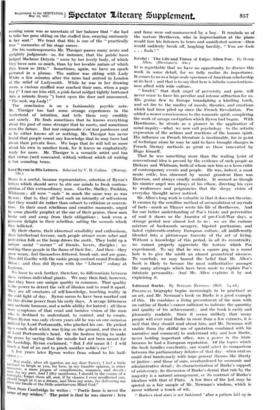Israel : The Life and Times of Edgar Allan Poe.
By Henry Allen. (Brentano's. 44s.) IT is regrettable that we have no opportunity to discuss this work in some detail, for we fully realize its importance. It comes to us as a large-scale specimen of American scholarship at its best ; and that is to say that here is infinite conscientious- ness allied with wide culture.
" Israfel," that dark angel of perversity and pain, will never cease to have his peculiar and intense attraction for us. His genius flew to Europe brandishing a kindling torch, and set fire to the medley of moods, theories, and emotions which had been piled up since the French Revolution. Poe added a newer consciousness to the romantic spirit, completing the work of savage castigation which Byron had begun. With Hawthorne, he stands as a pioneer in the application of mind-inquiry—what we now call psychology—to the artistic expression of the actions and reactions of the human spirit. His influence on French literature is inestimable, for in point of technique alone he may be said to have brought changes in French literary methods as great as those innovated by Hugo himself.
That he was something more than the wailing lyrist of conventional idea is proved by the evidence of such people as Dickens and Whitman, both of whom saw him as a keen critic of contemporary events and people. He was, indeed, a most acute critic, less obscured by moral grandeur than was Emerson, and always cruelly realistic. It seemed as though his sinister angel was always at his elbow, directing his eyes to weaknesses and poignancies that the sleepy vision of everyday thought never noticed.
Mr. Allen's long work is valuable in that it does not theorize. It creates by the coralline method of accumulation of myriads of facts—much as Thayer wrote his life of Beethoven. And for our better understanding of Poe's twists and perversities of soul it shows us the America of pm-Civil-War days, a strange period now almost lost to us ; we see the curious mixture of backwoods savagery, bigoted puritanism, and faded eighteenth-century European culture, all indifferently blended into a picturesque travesty of the art of living. Without a knowledge of this period, in all its eccentricity, we cannot properly appreciate the torture which Poe experienced. To say that he was a square peg in a round hole is to give the misfit an almost geometrical niceness. To conclude, we may hazard the belief that Mr. Allen's book is likely to become the most authoritative amongst the many attempts which have been made to explain Poe's intricate personality. And Mr. Allen explains it by not explaining it.


























































 Previous page
Previous page